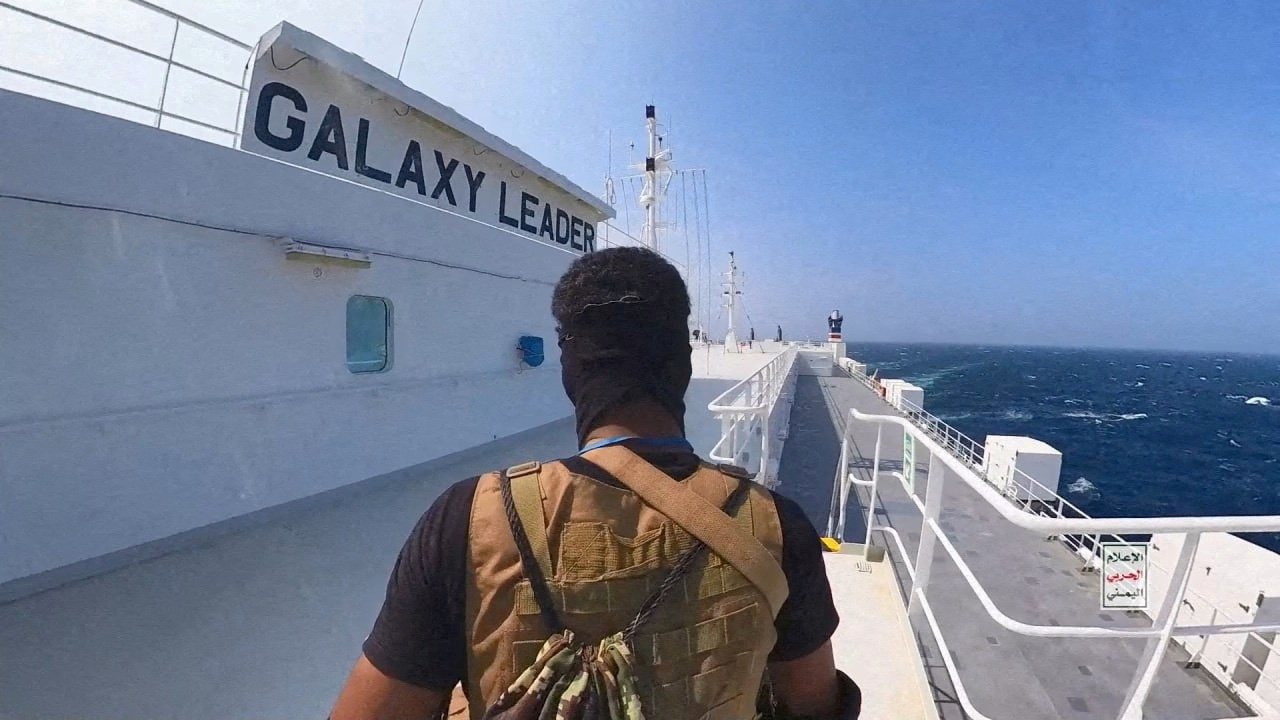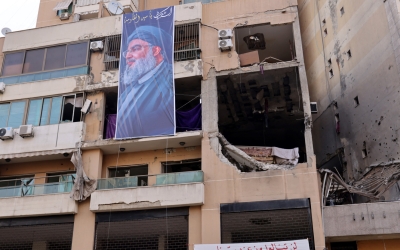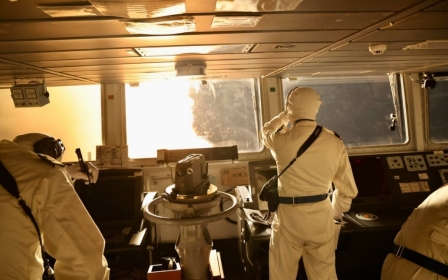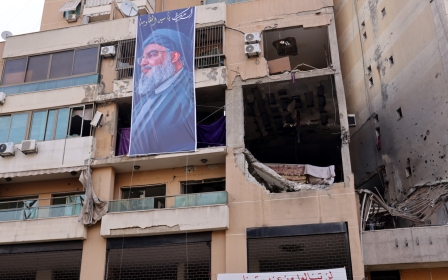Red Sea attacks: Why is Egypt helping Israel become the new trade corridor?

Since the launch of its Al-Aqsa Flood operation, the Palestinian group Hamas has been looking to its allies in the Iran-led "Axis of Resistance" for support in confronting Israel's brutal military force. Notably, many Axis members responded to the calls of the Palestinian resistance, albeit cautiously.
However, Yemen's contribution to the fight against Israeli aggression is perhaps having the most significant impact among the coalition partners.
Since November, Houthi armed forces have focused on maritime operations by blocking or seizing commercial ships they say are en route or linked to Israel. The group made clear that its objective was to enforce Article 1 of the Convention on the Prevention and Punishment of the Crime of Genocide - ratified by Yemen in 1989 - which requires states to "prevent and to punish" perpetrators of genocide.
The world has since felt the consequence of Yemen’s geographical position and its impact on international trade, given the close proximity of the Yemeni Perim Island to the Bab el-Mandeb Strait.
However, rather than force Israel to comply with international law and address the humanitarian crisis in Gaza, the US and its regional allies, including Egypt, have launched a joint project to transport cargo on land as an alternative trade route to the Red Sea.
New MEE newsletter: Jerusalem Dispatch
Sign up to get the latest insights and analysis on Israel-Palestine, alongside Turkey Unpacked and other MEE newsletters
Ironically, despite its role in precipitating the maritime clashes and regional tensions more broadly, Israel is positioning its port as the new corridor for global trade. This effort, which intends to divert traffic from the Suez Canal, will result in a major loss of income for Egypt and prove lucrative for Israel.
Turbulent waters
In December, the US launched "Operation Prosperity Guardian", a maritime task force to thwart Houthi attacks. The first clash occurred when the US fired on Houthi boats in the Red Sea on the last day of 2023. This was followed by several clashes, the most serious of which was last week, when the US and the UK, supported by only four countries, carried out air strikes against Yemeni territory.
Houthi threats on the corridor have roiled the shipping industry, forcing most of the commercial giants to bypass Bab el-Mandeb
They claimed during a session at the UN Security Council that their military actions are consistent with international law and the principle of self-defence. In light of this escalation, which provoked Houthi missile strikes against US-owned ships, we may witness a broadening of the ongoing war in the Middle East.
Besides the Hormuz and Malacca straits, Bab el-Mandeb is considered the most important strait in the world, as it connects the Indian Ocean with the Mediterranean Sea through the Red Sea and Suez Canal. So, to move from Asia to Israel, the Suez Canal, and Europe, cargo ships must first pass through the Bab el-Mandeb Strait.
The 26 km-wide strait is responsible for the passage of 25 percent of global trade, through which more than 4.5 million barrels of oil and over 21,000 vessels move every year. The ongoing Houthi threats on the corridor have roiled the shipping industry, causing marine insurance rates to skyrocket and forcing most of the commercial giants to bypass Bab el-Mandeb.
Ships re-routing through the Cape of Good Hope in South Africa has meant an increase in shipping costs, which are expected to continue to rise. The additional two- to three-week journey means increased prices of goods for consumers and, once again, higher inflation, which western governments and their central banks have been trying to reduce for more than a year and a half after the pandemic.
Follow Middle East Eye's live coverage of the Israel-Palestine war
In another effort to bypass the Red Sea, Israel, the UAE, and Egypt have similarly launched a "land bridge" project. An Israeli smart transportation company, Trucknet Enterprise, signed an agreement with Puretrans FZCO of Dubai and DP World UAE to use trucks to transport cargo along land routes from Dubai through Saudi Arabia and Jordan and into Israel.
There, cargo may continue its way to the Mediterranean through the Haifa Port or by land to Egypt and then use the ports of Ain Sokhna and Port Said on the Suez Gulf of Egypt. Trucknet has signed another memorandum of understanding, or MoU, with an Alexandria-based logistics company, WWCS, to manage the Egyptian side of the overland trade route.
The land bridge project can be considered an implemented version of the India-Middle East-Europe Economic Corridor (Imec), the plan first launched by US President Joe Biden during the G-20 summit held in New Delhi, India, last September.
Biden, an ardent Zionist, was perhaps aiming to revive the old Ben Gurion Canal project, conceived in the 1960s but which was put on hold for several decades due to Arab opposition and environmental concerns, as the plan was to use nuclear bombs to dig a canal in the Naqab (Negev) Desert.
For Biden, another key objective of Imec was to obstruct China’s expansive Belt and Road Initiative (BRI), which would use the Syrian Latakia seaport to access the Mediterranean.
Bypassing the Suez
In pushing for Imec, the American president's total disregard for Egyptian interests or the harmful effect of Imec on the Suez Canal has been remarkable.
Egyptian officials have also underestimated the threat the Imec corridor or the new land bridge project poses to the income generated by the Suez Canal, and are even involved in its implementation.
Many industry experts have expressed concerns about how these new trade routes will further weaken Egypt's economy while redrawing the economic-political map toward making Israel’s Haifa port a key gateway to Europe.
The Suez Canal has remained the most important project for Egypt for nearly two centuries. It provides the shortest and most economical global trade route from Asia to Europe, cutting down thousands of miles when it comes to connecting the East and West.
The Suez Canal therefore became an essential tributary of the Egyptian economy, as it is a major source of foreign currency, in addition to employing thousands in the Egyptian labour force.
However, as things continue to deteriorate in the Middle East, the Suez Canal may no longer enjoy its pre-eminent role. The course change through the Cape of Good Hope that many shipping lines have already adopted has led to a decline in ships using the Suez Canal, resulting in lost revenue.
With the Suez Canal making news headlines again, it is worth recalling the incident from March 2021, in which the container ship, Ever Given, and its billion-dollar cargo got stuck in the canal and "broke global trade".
The incident led to international calls for alternative trade routes amid questions about the reliability of the canal. As it did back then, the Egyptian regime must work strategically to reduce regional tensions in order to preserve its crucial $9.5bn Suez Canal income, as reported in the last fiscal year.
Given the impact on the Suez Canal, the lack of genuine effort by Egyptian authorities to de-escalate Israel's assault on Gaza is puzzling
Given the impact that the Houthis' Red Sea campaign has had on the Suez Canal, the lack of genuine effort by Egyptian authorities to de-escalate Israel's assault on Gaza is puzzling.
Notably, the Houthis have repeatedly stated that they would block ships from passing into Israel until at least aid can enter Gaza.
The Egyptian government could have challenged Israel's blockade and facilitated the entry of food, medicine, fuel, and other crucial aid into Gaza through the Rafah crossing, which remains closed. This move likely would have stopped the Houthi interception of ships early on.
Rather than investing in Israeli projects like the land bridge, which aims to permanently bypass the Suez Canal as a vital corridor for global trade to benefit the Haifa Port, Egyptian authorities should work to restore the flow of ships through the canal and use all their cards to end Israel's genocidal war on Gaza.
The views expressed in this article belong to the author and do not necessarily reflect the editorial policy of Middle East Eye.
This article is available in French on Middle East Eye French edition.
Middle East Eye delivers independent and unrivalled coverage and analysis of the Middle East, North Africa and beyond. To learn more about republishing this content and the associated fees, please fill out this form. More about MEE can be found here.






